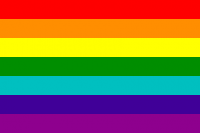1970s
The 1970s decade refers to the years from 1970 to 1979, inclusive.
In the Western world, the focus shifted from the social activism of the sixties to social activities for one's own pleasure, save for environmentalism, which continued in a very visible way. The seventies were characterized by the writer Tom Wolfe as the "Me Decade."
The perception of the established institutions of nuclear family, religion and trust in one's government continued to lose ground during this time. Major developments of the sexual revolution included the awareness of the impact of contraceptive pills on social-interactional relationships, and an increase in divorce rates, single-parent households, and pre-marital sex. By the end of the decade, the feminist movement had helped change women's working conditions. The Gay Rights movement became prominent, and the hippie culture, which started in the 1960s, peaked and carried on through the end of the decade. The United States' withdrawal from Vietnam and the resignation of Richard Nixon helped bring about a sense of malaise.
Social movements
Environmentalism
The seventies touched off a mainstream affirmation of the environmental issues early activists from the '60s, such as Rachel Carson, warned about. The moon landing that had occurred at the end of the previous decade transmitted back concrete images of the earth as an integrated, life-supporting system and shaped a public willingness to preserve nature. On April 22, 1970, the United States celebrated its first Earth Day in which over two thousand colleges and universities and roughly ten thousand primary and secondary schools participated.
Feminism
Feminism in the United States got its start in the 1960s but began to take flight starting in 1970, with the fiftieth anniversary of the passage of the Nineteenth Amendment to the United States Constitution (which legalized female suffrage).
With the anthology Sisterhood is Powerful and other works being published at the start of the decade, feminism started to reach a larger audience than ever before.
Gay rights
The Gay Pride Flag, symbol of the Gay Rights Movement, was first flown in 1978 in San Francisco. This is the current version, flying over The Castro in June 2005 The Stonewall riots, which occurred in New York City in June 1969, are generally considered to have ignited the modern gay rights movement, especially in North America (England and Wales had already decriminalised homosexuality in 1967). In the 1970s, in western countries and especially so in major urban centers, gay and lesbian people "came out of the closet" as never before (even as many others remained closeted) and a vocal and visible gay-rights movement coalesced in an unprecedented way.
Considering the profound stigma still attached to homosexuality at the dawn of the 1970s, the movement, although still nascent, saw tremendous gains over the course of the decade. The American Psychiatric Association removed homosexuality from its list of psychiatric disorders in 1973. Gay-rights ordinances were passed by several cities, beginning with Ann Arbor, Michigan in 1972, and in 1977, Quebec became the first jurisdiction larger than a city or county in the world to prohibit discrimination based on sexual orientation in the public and private sectors.
For the first time, a few openly gay people were elected to political office in the United States. In 1977, Harvey Milk, a politically active gay man in the emerging gay neighborhood The Castro, was elected to the Board of Supervisors in San Francisco, California. Milk and liberal San Francisco Mayor George Moscone were assassinated the following year. In 1979 their assassin, Dan White, received a sentence of voluntary manslaughter. The anger the gay community felt about the murders and about White's light sentence further galvanized the movement.
The increasing visibility of gay people also generated a backlash during the seventies. In perhaps the most discussed anti-gay rights campaign of the decade, singer Anita Bryant led a successful drive in 1977 to repeal a gay-rights ordinance in Miami-Dade County, Florida. The new openness about homosexuality proved disconcerting to some heterosexuals who had been accustomed to gay and lesbian people remaining closeted and politically silent. "The love that dare not speak its name," Canadian author Robertson Davies wrote during the decade, referencing the famous Lord Alfred Douglas quote, "has become the love that won't shut up."
On October 14, 1979, approximately 100,000 people marched in Washington, D.C., in the largest pro-gay rights demonstration up to that time.
- More information is available at [ Wikipedia:1970s ]
Chat rooms • What links here • Copyright info • Contact information • Category:Root
